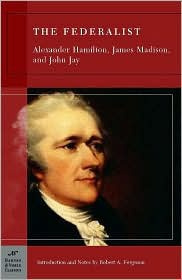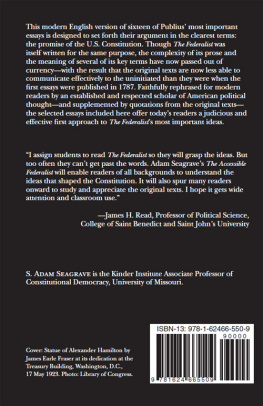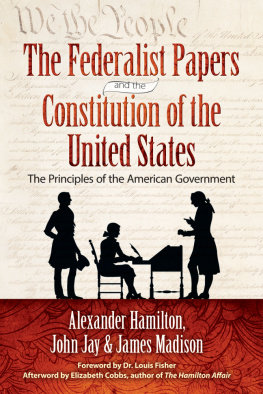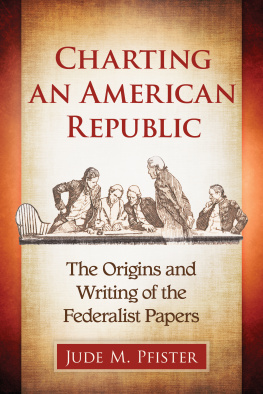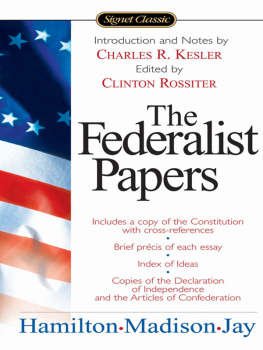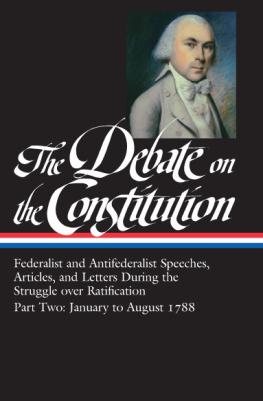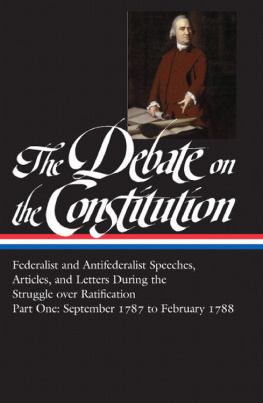Chapter FEDERALIST. No. 1
To the People of the State of New York:
AFTER an unequivocal experience of the inefficiency of thesubsisting federal government, you are called upon to deliberate ona new Constitution for the United States of America. The subjectspeaks its own importance; comprehending in its consequencesnothing less than the existence of the UNION, the safety andwelfare of the parts of which it is composed, the fate of an empirein many respects the most interesting in the world. It has beenfrequently remarked that it seems to have been reserved to thepeople of this country, by their conduct and example, to decide theimportant question, whether societies of men are really capable ornot of establishing good government from reflection and choice, orwhether they are forever destined to depend for their politicalconstitutions on accident and force. If there be any truth in theremark, the crisis at which we are arrived may with propriety beregarded as the era in which that decision is to be made; and awrong election of the part we shall act may, in this view, deserveto be considered as the general misfortune of mankind.
This idea will add the inducements of philanthropy to those ofpatriotism, to heighten the solicitude which all considerate andgood men must feel for the event. Happy will it be if our choiceshould be directed by a judicious estimate of our true interests,unperplexed and unbiased by considerations not connected with thepublic good. But this is a thing more ardently to be wished thanseriously to be expected. The plan offered to our deliberationsaffects too many particular interests, innovates upon too manylocal institutions, not to involve in its discussion a variety ofobjects foreign to its merits, and of views, passions andprejudices little favorable to the discovery of truth.
Among the most formidable of the obstacles which the newConstitution will have to encounter may readily be distinguishedthe obvious interest of a certain class of men in every State toresist all changes which may hazard a diminution of the power,emolument, and consequence of the offices they hold under the Stateestablishments; and the perverted ambition of another class of men,who will either hope to aggrandize themselves by the confusions oftheir country, or will flatter themselves with fairer prospects ofelevation from the subdivision of the empire into several partialconfederacies than from its union under one government.
It is not, however, my design to dwell upon observations of thisnature. I am well aware that it would be disingenuous to resolveindiscriminately the opposition of any set of men (merely becausetheir situations might subject them to suspicion) into interestedor ambitious views. Candor will oblige us to admit that even suchmen may be actuated by upright intentions; and it cannot be doubtedthat much of the opposition which has made its appearance, or mayhereafter make its appearance, will spring from sources, blamelessat least, if not respectablethe honest errors of minds led astrayby preconceived jealousies and fears. So numerous indeed and sopowerful are the causes which serve to give a false bias to thejudgment, that we, upon many occasions, see wise and good men onthe wrong as well as on the right side of questions of the firstmagnitude to society. This circumstance, if duly attended to, wouldfurnish a lesson of moderation to those who are ever so muchpersuaded of their being in the right in any controversy. And afurther reason for caution, in this respect, might be drawn fromthe reflection that we are not always sure that those who advocatethe truth are influenced by purer principles than theirantagonists. Ambition, avarice, personal animosity, partyopposition, and many other motives not more laudable than these,are apt to operate as well upon those who support as those whooppose the right side of a question. Were there not even theseinducements to moderation, nothing could be more ill-judged thanthat intolerant spirit which has, at all times, characterizedpolitical parties. For in politics, as in religion, it is equallyabsurd to aim at making proselytes by fire and sword. Heresies ineither can rarely be cured by persecution.
And yet, however just these sentiments will be allowed to be, wehave already sufficient indications that it will happen in this asin all former cases of great national discussion. A torrent ofangry and malignant passions will be let loose. To judge from theconduct of the opposite parties, we shall be led to conclude thatthey will mutually hope to evince the justness of their opinions,and to increase the number of their converts by the loudness oftheir declamations and the bitterness of their invectives. Anenlightened zeal for the energy and efficiency of government willbe stigmatized as the offspring of a temper fond of despotic powerand hostile to the principles of liberty. An over-scrupulousjealousy of danger to the rights of the people, which is morecommonly the fault of the head than of the heart, will berepresented as mere pretense and artifice, the stale bait forpopularity at the expense of the public good. It will be forgotten,on the one hand, that jealousy is the usual concomitant of love,and that the noble enthusiasm of liberty is apt to be infected witha spirit of narrow and illiberal distrust. On the other hand, itwill be equally forgotten that the vigor of government is essentialto the security of liberty; that, in the contemplation of a soundand well-informed judgment, their interest can never be separated;and that a dangerous ambition more often lurks behind the speciousmask of zeal for the rights of the people than under the forbiddenappearance of zeal for the firmness and efficiency of government.History will teach us that the former has been found a much morecertain road to the introduction of despotism than the latter, andthat of those men who have overturned the liberties of republics,the greatest number have begun their career by paying an obsequiouscourt to the people; commencing demagogues, and ending tyrants.
In the course of the preceding observations, I have had an eye,my fellow-citizens, to putting you upon your guard against allattempts, from whatever quarter, to influence your decision in amatter of the utmost moment to your welfare, by any impressionsother than those which may result from the evidence of truth. Youwill, no doubt, at the same time, have collected from the generalscope of them, that they proceed from a source not unfriendly tothe new Constitution. Yes, my countrymen, I own to you that, afterhaving given it an attentive consideration, I am clearly of opinionit is your interest to adopt it. I am convinced that this is thesafest course for your liberty, your dignity, and your happiness. Iaffect not reserves which I do not feel. I will not amuse you withan appearance of deliberation when I have decided. I franklyacknowledge to you my convictions, and I will freely lay before youthe reasons on which they are founded. The consciousness of goodintentions disdains ambiguity. I shall not, however, multiplyprofessions on this head. My motives must remain in the depositoryof my own breast. My arguments will be open to all, and may bejudged of by all. They shall at least be offered in a spirit whichwill not disgrace the cause of truth.

![Jay John The Federalist : a collection of essays, written in favour of the new Constitution, as agreed upon by the Federal Convention, September 17, 1787. : In two volumes. Vol. I[-II.]](/uploads/posts/book/76130/thumbs/jay-john-the-federalist-a-collection-of-essays.jpg)
